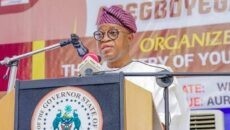In only forty years, Ashiru Olatoye Olaniyan II, the Olobu of Ilobu, has steered the hitherto rural community, towards growth and development, in the process forging an uncommon sense of pride and belonging among indigenes
For Oba Ashiru Olatoye Olaniyan II, the Olobu of Ilobu, 40 years as a traditional ruler is an uncommon milestone. From a backwater community, where farming and hunting are the main preoccupation of the people, Ilobu, under the watch of Oba Olaniyan, has prospered, with indigenes excelling in academics and politics. From the streets, places of worship and relaxation centres, Ilobu will, this week, be abuzz with celebration and thanksgiving.
“It is an uncommon favour. God has prospered us and we are joyful. It is a thing of joy to me that today our children are successful. If your children are successful, it is a thing of joy to the parents. We thank the Almighty because he showed us mercy in this town,’’ says the reflective king.
Ilobu has come full cycle in 40 years. When Olaniyan became the king in 1974, Ilobu was a four-district town with five primary schools. Except for the United Central School, which later became Secondary Modern School in 1967, pupils from Ilobu trekked kilometres to attend a secondary school in other communities. Poverty walked tall on the streets of Ilobu; there were only four private cars in the entire town at the time.
“If we had to buy cement or any building material before, we had to go to Osogbo, which is six kilometres away. Now that has become history. Everything you may want to buy on this planet is now here. You can only venture out if you are not satisfied with the price. Our king is also the first to wear a beaded crown in this town. His predecessors wore caps,” says Alabi Dauda, the Otun Jagun and the first automobile dealer in the town.
From a smattering of primary schools and few religious centres, Oba Olaniyan worked hard with elders in the town to encourage religious leaders and government to provide an enabling environment. In Ilobu today, education is attractive with 12 government-owned primary schools and 33 private primary schools. Government has also established six secondary schools while there are eight private secondary schools in the town.
Religious centres have also flourished. Oba Olaniyan says there were just few places for both Muslims and Christians to worship in 1974. That is no longer the case. There are more than 120 small mosques and 28 big Jummat mosques in the town. Churches in the town are also about 40. Indeed, the first massive Ilobu Central Mosque and church in the environs were built with communal efforts first in Ilobu. The result was that indigenes of Ifon and Erin, Ilobu’s closest neighbours now troop to Ilobu to attend religious services. “The first church in Ifon, Erin and Ilobu is here in Ilobu, same for the mosque. People from Ifon and Erin used to come here to worship,” says Olasupo Olanrele, vice principal, Ima High School, Ilobu an indigene who has lived in the town all his life.
Over the years, Oba Olaniyan has shown his commitment to the development of the town. He established the Royal Palace Hotel, thereby creating employment opportunities for Ilobu indigenes. It was also a measure to attract investors to the town. “We are not lazy in Ilobu. In 1974, there were just four cars in this town. Mine was the fifth. But you just look around now and see the difference. There is no compound in Ilobu now without multiple cars. In 1975, we were connected to the national grid. The community has built a town hall and in 1976 we were given a local government. We are still asking for another local government, we deserve it by our population,” says the monarch.
Indeed, Oba Olaniyan had a blue print for the development of Ilobu. Aside from being the traditional head, he mobilised his people to ensure that they enjoy the presence of government and the benefits of governance. In 1976, just two years on the throne, Oba Olaniyan, in the company of four other elders in the town travelled to Ibadan to lobby for the creation of a local government in Ilobu. It was an altruistic action that nearly cost him his life and that of his elders.
“We were coming back in the middle of the night and something just crossed the road. Our driver was an old man but an expert. As soon as he stepped on the brake, the vehicle zoomed into the bush and somersaulted into the Asejire River near Ibadan. But God saved us, we were not hurt,” recalls Dauda who was on the trip.
Their effort, however, paid off. “Before the delegation came back from Ibadan, we were already rejoicing in the town because we heard it on the news that a new local government had been created in Ilobu. That means the delegation, led by the king, singlehandedly brought a local government to Ilobu,” insists Olanlere.
Aside from the creation of a local government council for the people of Ilobu, Oba Olaniyan, with the help of the community, built a modern palace, an expansive town hall called Ilobu House and a library for students. The library was the product of collaboration between the Ilobu Development Union, IDU, and the Community Development and Social Mobilisation, a government agency. The Ilobu House, first started in 1994, has so far gulped over N90 million.
In the last forty years, Ilobu as enjoyed the attention of government to some degree. There is the yet-to- be commissioned Omoluabi Youth Rehabilitation Center. The Ilobu Microfinance Bank which was formerly a branch of the defuct National Bank, serves the banking needs of the people. The Ilobu Comprehesive Health Center, commissioned by Bisi Akande, former governor, serves the medical needs of the people.
Indigenes of Ilobu have described Oba Olaniyan as a blessing to the community. Olalekan Yusuf, vice president, IDU, said Oba Olaniyan is never tired of attracting guests to Ilobu. “Kabiyesi is very industrious and accommodating. He loves education and wants every indigene of this town to succeed. I was with him 20 years ago when he personally distributed the 20th anniversary invitation. We went as far as Oyo and Saki,” he explained.
While Oba Olaniyan is taking stock of his 40-year reign as a traditional ruler, he remembers that Ilobu has also prospered politically during his tenure. The town has produced humane politicians who have served government at various levels. They include Sola Akinwumi, a former secretary to the state government, SSG, Lasun Yusuf, a current member of the House of Representatives, Tunde Ojeniran, a minister in the First Republic; Remi Wilson a former commissioner for finance and many others.
However, Ilobu is still yearning for more government attention in terms of roads, potable water and the establishment of a higher institution. The indigenes believe that Ilobu has been marginalised in terms of higher institution. “We were supposed to have a campus of the Osun State University. A branch of the Open University was also approved for us but Osogbo snatched it. We are not relenting, however, we want another local government in this town. Look at the bridge on the way to Osogbo, it is so narrow that only one vehicle can pass at a time. Though Governor Rauf Aregbesola has promised to do it if the federal government fails to do it. We are still hopeful,” says Yusuf.
He shares that opinion with Oba Olaniyan. “I want a higher institution of learning here in Ilobu. Where there is knowledge, there is development. We want a university of polytechnic. At the very least we want a college of education. We are appealing to the state and federal government; let us have higher institutions of learning here. We have the land to donate to them,’’ he says.
Follow Us on Social Media









 WhatsApp us
WhatsApp us